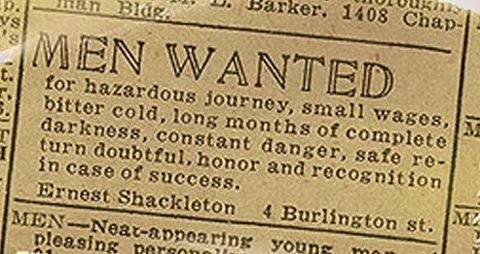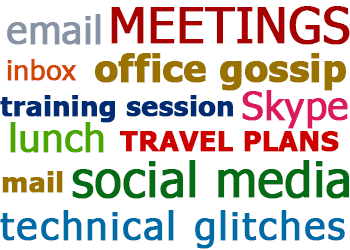Something they don’t teach in college is how to know when to move on. After graduating, many people’s initial focus is finding a job – pretty much any job, particularly if they have debt looming over them. If it’s relevant to their studies, all the better. This causes people to settle early and often, making the promise of skills being applied be enough to sign on to a company. And once you’re in it, there is always the fear of losing tenure if you move on too quickly. Shockingly, research has found that 70% of the US workforce is not reaching its full potential, with 52% of those workers unengaged, and another 18% are actively disengaged in their current jobs. This costs an estimated $450-550 billion in lost productivity each year.
Here’s how to decide if a career change is right for you.
1 – “My heart isn’t in it.”
Sometimes, the work that you thought you signed up for can fall short of expectations. You may enter a job and realize that this sort of position may not be right for you. This can be discouraging, greatly impact your productivity, and make it hard to keep work exciting. Especially when starting your first career-path position, you can be surprised by how the job compares to your expectations.
 The best way to go about these apathetic feelings is to define what you want from the position. Maybe you were looking for a certain skill set or were looking to advance within a company. Whatever your initial motivations, list them and look at them critically in accordance to what you are gaining currently. Make a list of what the job provides you, mirror that against what the job promised (maybe in a job posting or offer letter) and identify the focus.
The best way to go about these apathetic feelings is to define what you want from the position. Maybe you were looking for a certain skill set or were looking to advance within a company. Whatever your initial motivations, list them and look at them critically in accordance to what you are gaining currently. Make a list of what the job provides you, mirror that against what the job promised (maybe in a job posting or offer letter) and identify the focus.
For example, if you took a sales job to gain experience working with a certain client, write that down. Did the hiring manager promise this client to be part of your job scope? If so, and you haven’t made contact with them, it could be time to reach out to a superior and ask about your responsibilities. Having this initiative will show how prepared you are to move forward within the company, and achieving this initial goal will surely revitalize your drive. However, if the company can no longer provide you this opportunity and network, consider whether or not it meets your other career needs and think about how you could achieve this goal, even if it is with another company.
2 – “I’m not receiving proper reward or recognition.”
If you take a job that promises promotions, bonuses, and other compensation or movement and you have been with the company for quite some time, you may be wondering when those perks will appear. It’s hard to approach this topic with a superior, because you know that these things are earned, not given. However, if this was what drew you to the company and it has not been attained, you may start to second-guess your employment decision.
The first thing you need to do is know your facts. Dig out your offer letter from the company and find any material you can on their compensation scheme and benefits. Go online and use tools like Glassdoor’s Compensation Analyst or LinkedIn’s Salary Estimator to see how your compensation package compares to what other companies are offering in your industry and location. Set your expectations based on real-time facts and figures and analyze how your company may meet or exceed these standards.
If you are making above average in your qualifications and title, this should give you a new appreciation for your company and position. You may be luckier than you think! Perhaps your job has fallen short of industry norms or your company hasn’t fulfilled their promises of retention bonuses or perks. Approach your manager or HR and discuss your concerns in a respectful and constructive way. The worst thing you can do is remain inactive in your worry.
3 – “I don’t trust the company” or “I don’t fit the culture.”
This can be a tough situation. What people typically run into with a new position is the insider’s view they can get of a company’s philosophy. Something you must remember when starting a new job is that the first 90 days isn’t just the company watching to see if you’ll be a right fit, but for you to watch and see if the company is the right fit. Research shows that, “only 41% of employees felt that they know what their company stands for and what makes its brand different from its competitors’ brands.”

There are a few outlets to research the culture of a company, including looking up their employee reviews on Glassdoor; reading their client reviews on Yelp, Google, and Indeed. Look at the company’s website, social media pages, and LinkedIn to see how they interact with their industry, community, and employees. These give you an idea of what the company stands for and prepares you before accepting the offer.
However, just as individuals post idealized images of their lives on Facebook, companies can construct the perfect workplace image online. When your company turns out differently than you expect after signing on, you can approach HR and discuss your concerns. The same applies if you are uncomfortable with your company’s ethos or atmosphere. A big part of career satisfaction comes from the workplace environment. If you are uncomfortable with it, chances are you are not the only one. Speak up. Use your resources. Consider moving elsewhere if no improvements can be made.
4 – “I’m not living up to my full career potential.”
According to Gallup research, “an alarming 70% of American employees aren’t working to their full potential.” This feeling is something many people have but are reluctant to face. Perhaps when you entered the position, you thought you would be gradually given more responsibility and/or visibility and have since felt like your hard work has gone unnoticed or doesn’t support your company’s goals. The important task here is to define what you want to be doing, and then plan ways to get there.
What is your potential? What skills can you offer that aren’t being put to use, and how can they be put to use? Know your worth and become your own biggest supporter. If you think you can handle a larger portfolio, ask your manager for an extra client. If you want to showcase your abilities in design, ask. Take a stab at a proposal before the company presents to the client. Sometimes it may not be a lack of management’s interest or confidence in your abilities. Your potential can be overlooked if it goes unknown to the company’s decision makers.
However, it can always be possible that this position does not fit your capabilities. Maybe you are meant to be in another role with more clientele or creativity. If that’s the case, a change could be the answer to living up to your full potential. Never assume you are undervalued if you haven’t proven your value, but never settle if you aren’t challenged and engaged.
5 – “There’s no room for upward movement.”
 A greater problem still can come from a position where you are familiar with the company, have gained a lot of rewarding experience, and are passionate about what you do. Yet, you’ve moved to the top of your department and cannot experience any more vertical growth. This is always heartbreaking, because it’s likely that if you have been with the company long enough to grow that far, you are comfortable with all other aspects of the company.
A greater problem still can come from a position where you are familiar with the company, have gained a lot of rewarding experience, and are passionate about what you do. Yet, you’ve moved to the top of your department and cannot experience any more vertical growth. This is always heartbreaking, because it’s likely that if you have been with the company long enough to grow that far, you are comfortable with all other aspects of the company.
But maybe that’s the problem. Being too comfortable can limit your achievements. If you have asked all the right questions, gone to the CEO about further growth, and have gotten everything you can from the position, it may be time to search for another career opportunity that can provide you with new experiences.
No matter the case, making a career move can be difficult. If you relate to any of the issues above and have not been able to find a fix within your current company, know that the job pool is large. We want to encourage you to look for your perfect fit.
Need help in your search? Have questions? Contact us at info@bluesignal.com.





 “Tell me about some of your key metrics.”
“Tell me about some of your key metrics.” Who is driving?
Who is driving? 
 When employees come up with new ideas and find new ways of doing things, it is a sure sign that they have good motivation and are engaged in their jobs. A quick way to kill that motivation is to gloss over their ideas. Even if the idea is totally unworkable, enthusiastic acknowledgement of their effort is critical.
When employees come up with new ideas and find new ways of doing things, it is a sure sign that they have good motivation and are engaged in their jobs. A quick way to kill that motivation is to gloss over their ideas. Even if the idea is totally unworkable, enthusiastic acknowledgement of their effort is critical.

 It’s a good investment of time.
It’s a good investment of time.

 Many departments struggle to quantify their ROI. Not sales! Salespeople are fortunate to have easy access to the impact they have had on their company’s bottom line. Most companies publish regular reports showing rankings, quotas, revenue, and other metrics. This is a key advantage because it is direct proof of success.
Many departments struggle to quantify their ROI. Not sales! Salespeople are fortunate to have easy access to the impact they have had on their company’s bottom line. Most companies publish regular reports showing rankings, quotas, revenue, and other metrics. This is a key advantage because it is direct proof of success. Top salespeople have to be big-picture and detail-oriented at the same time. When it comes to closing high-profile deals, they need to anticipate a prospect’s objections and overcome them with solid, compelling data. The same rule applies in an interview.
Top salespeople have to be big-picture and detail-oriented at the same time. When it comes to closing high-profile deals, they need to anticipate a prospect’s objections and overcome them with solid, compelling data. The same rule applies in an interview. Top candidates know they are highly sought-after. They are regularly approached by recruiters or head-hunters and rarely apply to open jobs. Do not treat them as any other applicant; roll out the red carpet.
Top candidates know they are highly sought-after. They are regularly approached by recruiters or head-hunters and rarely apply to open jobs. Do not treat them as any other applicant; roll out the red carpet. The interview area will give the candidate a reasonable expectation of the company’s work environment. Candidates intentionally put themselves in hyper-observant mode and notice everything. Take a walk along the route an interviewee would take through the building, and observe the surroundings through their eyes.
The interview area will give the candidate a reasonable expectation of the company’s work environment. Candidates intentionally put themselves in hyper-observant mode and notice everything. Take a walk along the route an interviewee would take through the building, and observe the surroundings through their eyes.
 Candidates hear actions, not words. A prompt, efficient hiring process is evidence of the speed of daily business within the team. The most sought-after candidates stay busy. Time is money for candidates as well as for companies, and the time investment for a full interview cycle represents a substantial opportunity cost for them.
Candidates hear actions, not words. A prompt, efficient hiring process is evidence of the speed of daily business within the team. The most sought-after candidates stay busy. Time is money for candidates as well as for companies, and the time investment for a full interview cycle represents a substantial opportunity cost for them.


